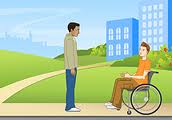Basics
Contents
Ask before you help
We should not assume that if anyone has some disability he/she would be in need of help. People with disabilities can usually get around fine and can be independent if settings are conducive and accessible. Adults with disabilities want to be treated as independent people. We need to offer assistance only if the person appears to need it. And if she does want help, we need to ask how before we act.
Be careful about physical contact
Some people with disabilities depend on their arms for balance. Grabbing them—even if with intention to help can prove to be problem for them—It can knock them off balance. Patting on head and shoulders should be avoided. We need to be careful while touching their wheelchair,crutches or cane. These equipments are a part of their personal space.
Think before you speak
Always speak directly to the person with a disability, not to his companion, aide or sign language interpreter. Making small talk with a person who has a disability is great; just talk to him as you would with anyone else. Respect his privacy. If you ask about his disability, he may feel like you are treating him as a disabled, not as a human being. Many people with disabilities get uncomfortable with children’s natural curiosity but those with mature minds do not mind if a child asks them questions. We must treat the people who have a disability as individuals—as our friends, co-workers, neighbors—rather than categorizing them in a different group.
Don’t make assumptions
People with disabilities are the best judge of what they can or cannot do. We need not decide for them about participating in any activity. They should not be excluded from any activity on the basis presumptions about their limitations.
Respond in a gracious manner to requests
When people who have a disability ask for an accommodation at your business, it is not a complaint. It shows they feel comfortable enough in your establishment to ask for what they need. And if they get a positive response, they will probably come back again and tell their friends about the good service they received.
Terminology Tips
Put the person first. Say “person with a disability” rather than “disabled person.” Say “people with disabilities” rather than “the disabled.” For specific disabilities, saying “person with Tourette syndrome” or “person who has cerebral palsy” is usually a safe bet. Still, individuals do have their own preferences. If you are not sure what words to use, ask.
Avoid outdated terms like “handicapped” or “crippled.” Be aware that many people with disabilities dislike jargony, euphemistic terms like “physically challenged” and “differently abled.” Say “wheelchair user,” rather than “confined to a wheelchair” or “wheelchair bound.” The wheelchair is what enables the person to get around and participate in society; it’s liberating, not confining.
With any disability, avoid negative, disempowering words, like “victim” or “sufferer.” Say “person with AIDS” instead of “AIDS victim” or “person who suffers from AIDS.”
It’s okay to use idiomatic expressions when talking to people with disabilities. For example, saying, “It was good to see you,” and “See you later,” to a person who is blind is completely acceptable; they use these expressions themselves all the time!
Many people who are Deaf communicate with sign language and consider themselves to be members of a cultural and linguistic minority group. They refer to themselves as Deaf with a capital “D,” and may be offended by the term “hearing impaired.” Others may not object to the term, but in general it is safest to refer to people who have hearing loss but who communicate in spoken language as “hard of hearing” and to people with profound hearing losses as Deaf or deaf.

